Kia Picanto vs Nissan Juke - Differences and prices compared
Compare performance (68 HP vs 143 HP), boot space and price (15300 £ vs 21400 £) at a glance. Find out which car is the better choice for you – Kia Picanto or Nissan Juke?
Costs and Efficiency:
Price and efficiency are often the first things buyers look at. Here it becomes clear which model has the long-term edge – whether at the pump, the plug, or in purchase price.
Kia Picanto has a distinct advantage in terms of price – it starts at 15300 £, while the Nissan Juke costs 21400 £. That’s a price difference of around 6085 £.
Fuel consumption also shows a difference: Nissan Juke manages with 4.70 L and is therefore to a small extent more efficient than the Kia Picanto with 5.60 L. The difference is about 0.90 L per 100 km.
Engine and Performance:
Power, torque and acceleration are the classic benchmarks for car enthusiasts – and here, some clear differences start to show.
When it comes to engine power, the Nissan Juke has a clearly edge – offering 143 HP compared to 68 HP. That’s roughly 75 HP more horsepower.
In acceleration from 0 to 100 km/h, the Nissan Juke is decisively quicker – completing the sprint in 10.10 s, while the Kia Picanto takes 14.60 s. That’s about 4.50 s faster.
In terms of top speed, the Nissan Juke performs minimal better – reaching 180 km/h, while the Kia Picanto tops out at 162 km/h. The difference is around 18 km/h.
There’s also a difference in torque: Nissan Juke pulls clearly stronger with 200 Nm compared to 96 Nm. That’s about 104 Nm difference.
Space and Everyday Use:
Beyond pure performance, interior space and usability matter most in daily life. This is where you see which car is more practical and versatile.
Both vehicles offer seating for 5 people.
In curb weight, Kia Picanto is somewhat lighter – 1124 kg compared to 1274 kg. The difference is around 150 kg.
In terms of boot space, the Nissan Juke offers clearly perceptible more room – 422 L compared to 255 L. That’s a difference of about 167 L.
In maximum load capacity, the Nissan Juke performs distinct better – up to 1305 L, which is about 295 L more than the Kia Picanto.
When it comes to payload, Nissan Juke evident takes the win – 427 kg compared to 332 kg. That’s a difference of about 95 kg.
Who wins the race?
The Nissan Juke proves to be leaves the rival little chance and therefore becomes our DriveDuel Champion!
Nissan Juke is the better all-rounder in this comparison.
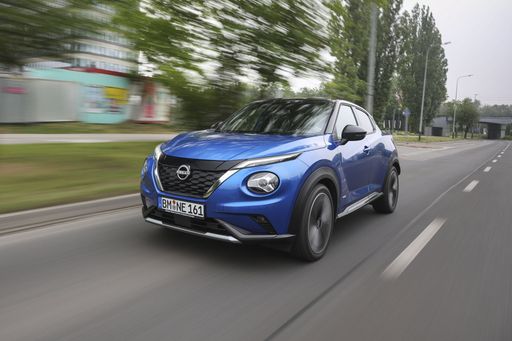
Nissan Juke
Costs and Consumption
View detailed analysis
Engine and Performance
View detailed analysis
Dimensions and Body
View detailed analysis
Kia Picanto
Kia Picanto is a cheeky city hatch that squeezes surprising style, practicality and a smile-inducing drive into a pocket-friendly package. It’s ideal for urban buyers who want fuss-free running, effortless parking and a car that punches above its class without pretending to be anything it’s not.
details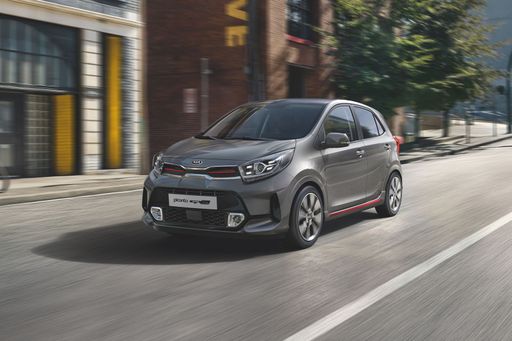
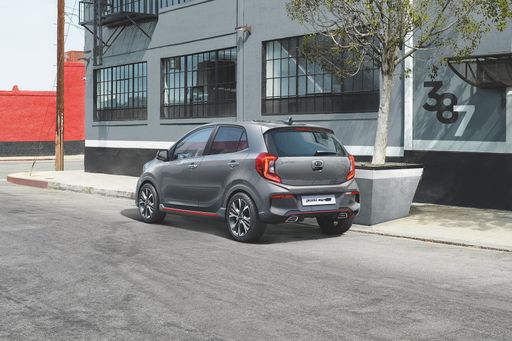
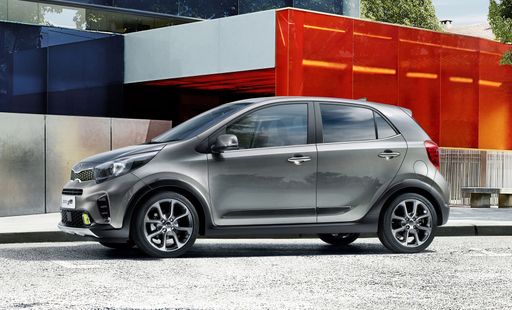
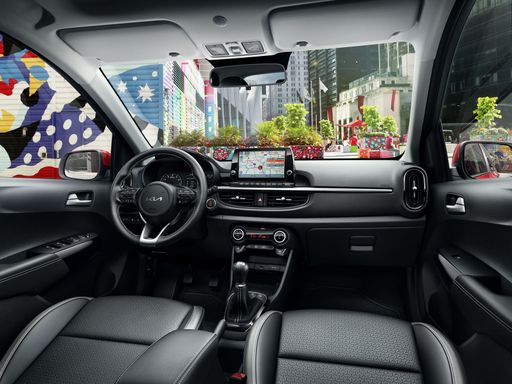
Nissan Juke
The Nissan Juke is a pocket-sized crossover that refuses to blend in, with quirky styling and a cheeky stance that turns heads at every traffic light. It’s ideal for shoppers who value personality and nimble urban driving over maximum practicality, delivering surprising pep and a well-equipped feel for everyday fun.
details
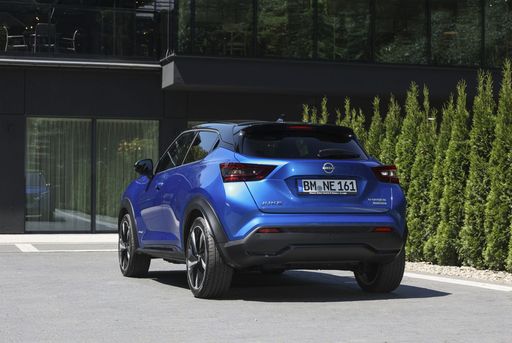
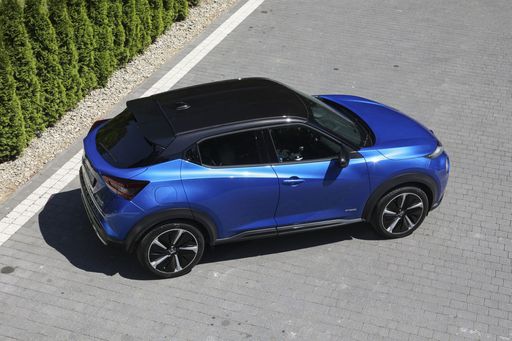


|

|
|
|
|
Costs and Consumption |
|
|---|---|
|
Price
15300 - 19300 £
|
Price
21400 - 30100 £
|
|
Consumption L/100km
5.6 - 5.9 L
|
Consumption L/100km
4.7 - 6 L
|
|
Consumption kWh/100km
-
|
Consumption kWh/100km
-
|
|
Electric Range
-
|
Electric Range
-
|
|
Battery Capacity
-
|
Battery Capacity
0.60 kWh
|
|
co2
127 - 135 g/km
|
co2
107 - 136 g/km
|
|
Fuel tank capacity
35 L
|
Fuel tank capacity
46 L
|
Dimensions and Body |
|
|---|---|
|
Body Type
Hatchback
|
Body Type
SUV
|
|
Seats
4 - 5
|
Seats
5
|
|
Doors
5
|
Doors
5
|
|
Curb weight
1124 - 1131 kg
|
Curb weight
1274 - 1405 kg
|
|
Trunk capacity
255 L
|
Trunk capacity
354 - 422 L
|
|
Length
3605 mm
|
Length
4210 mm
|
|
Width
1595 mm
|
Width
1800 mm
|
|
Height
1485 mm
|
Height
1593 mm
|
|
Max trunk capacity
1010 L
|
Max trunk capacity
1237 - 1305 L
|
|
Payload
253 - 332 kg
|
Payload
405 - 427 kg
|
Engine and Performance |
|
|---|---|
|
Engine Type
Petrol
|
Engine Type
Petrol, Full Hybrid
|
|
Transmission
Manuel, Automatic
|
Transmission
Manuel, Automatic
|
|
Transmission Detail
Manual Gearbox, Automated Manual
|
Transmission Detail
Manual Gearbox, Dual-Clutch Automatic, Automatic Gearbox
|
|
Drive Type
Front-Wheel Drive
|
Drive Type
Front-Wheel Drive
|
|
Power HP
68 HP
|
Power HP
114 - 143 HP
|
|
Acceleration 0-100km/h
14.6 - 17.2 s
|
Acceleration 0-100km/h
10.1 - 11.8 s
|
|
Max Speed
160 - 162 km/h
|
Max Speed
166 - 180 km/h
|
|
Torque
96 Nm
|
Torque
200 Nm
|
|
Number of Cylinders
3
|
Number of Cylinders
3 - 4
|
|
Power kW
50 kW
|
Power kW
84 - 105 kW
|
|
Engine capacity
998 cm3
|
Engine capacity
999 - 1598 cm3
|
General |
|
|---|---|
|
Model Year
2025
|
Model Year
2024
|
|
CO2 Efficiency Class
D
|
CO2 Efficiency Class
D, E, C
|
|
Brand
Kia
|
Brand
Nissan
|
What drive types are available for the Kia Picanto?
Available configurations include Front-Wheel Drive.
The prices and data displayed are estimates based on German list prices and may vary by country. This information is not legally binding.
